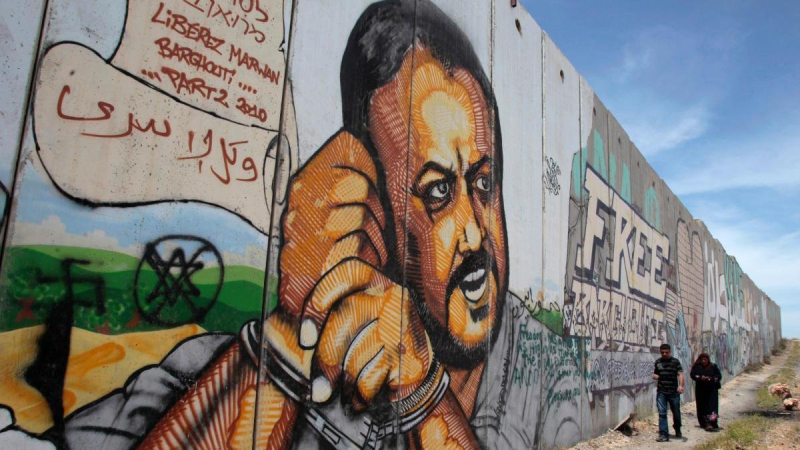Now aged nearly 65, and held inside an Israeli prison for 22 years, Marwan Barghouthi is the person most likely to become Palestinian president (should the man and the occupied nation release themselves from their captors/colonisers). At least this is what Tomorrow’s Freedom claims. The film investigates roughly three decades in the life of a politician who “cannot be broken”, and whose will for self-determination continues to influence Palestinians everywhere. Comparisons to Mandela are inevitable and indeed explored to exhaustion. In addition to sharing the decades-long prison stint, both men have a calm demeanour and eloquent rhetoric.. The late South African revolutionary leader is featured repeatedly throughout this 97-minute documentary, including his claim that “there can be no freedom without Palestinian freedom” and his advocating for violence as a weapon against brutal oppression.
The story zigzags back and forth in time. It reveals the humble origins of Marwan, his rise to power, and – most significantly – the struggle of his family and partisans in order to release him from prison this century. There are no recent images of our protagonist because Israelis have only allowed him to be interviewed from prison once, nearly 20 years ago. His captors held him in solitary confinement for several years, and continue to inflict all sorts of psychological torture to this date in an attempt to destroy his infrangible will. He is held is a high security prison far from his native West Bank, on Israeli soil (in one of the many breaches of international law which Israel routinely makes). We learn that Marwan became a prominent warrior both in the First and the Second Intifada. He was released from jail under the terms of the Oslo Accords of 1994, which Israel quickly disregarded: in the following three years: the number of illegal Israeli settlers in the occupied West Bank doubled (from 200,000 to a staggering 400,000). This led to the Second Intifada, which in turn culminated in Marwan’s permanent arrest.
The most powerful moments of the film are the court hearings, as Israelis insult Marwan (“criminal”, “murderer”), and a judge call him a “terrorist” before the trial even began (thereby exposing the deeply biased and flawed nature of the proceedings). There is also abundant interaction with all members of his family: his wife Fadwa, his sons Qassam, Aarab, Sharaf, and his daughter Ruba. Qassam also received a lengthy prison sentence for his activist work, which ironically gave him the opportunity to spend time with his father (as the two men briefly shared the same facility). Fadwa continues to campaign exhaustively for her husband’s release, however even a prison visit becomes increasingly elusive.

The movie is dotted with pro-Palestinian statements and praise of Marwan by prominent politicians and intellectuals from around the globe, including Marxist feminist Angela David, late archbishop Desmond Tutu, Nobel Peace Prize laureate Adolfo Perez Esquivel, and even former Potus Jimmy Carter. Former Israeli Justice Minister Yossi Beilin also becomes an unlikely interviewee and ally. Some of these testimonials were captured for the film, while others are archive footage, in a documentary that blends many languages and formats. This isn’t a problem per se. The biggest issue is that the story is patchy and incoherent, while the film execution is clumsy: from the abrupt editing to the syrupy instrumental score. The camerawork is very precarious, but this is a common feature of guerrilla journalism, and I couldn’t blame it on the two sister directors, who double down as DoPs. On the other hand, there could have been more work at post-production.
Tomorrow’s Freedom provides some insight into the life and the struggle of a fascinating – and yet little-known – political leader. Ultimately, the documentary feels neither exploitative nor intimate. Just distant and incomplete. Strangely, no date is displayed for the most recent events, while the older developments are almost invariably tagged with a year. The sensation I get is that the film was finished around 2018 and left in the back burner (fridge maybe?) until now because there was limited appetite for Palestinian narratives, and then it was hastily rescued and assembled after October 7th (when the Palestinian topic became prominent again).
Worth a viewing, as long as you remain aware of the filmic limitations. Just sit back and learn a little more about the erased history of Palestinian people.
Tomorrow’s Freedom is in cinemas on Friday, April 26th.








